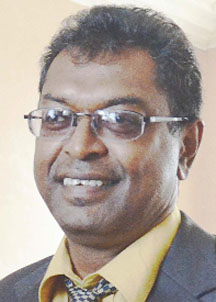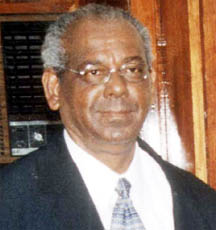A declining population in Region Six as shown by the census means that if the PPP wants to continue holding political power it has to share it, according to former party stalwart, Ralph Ramkarran.
In his column in yesterday’s Sunday Stabroek, Ramkarran said that the long-awaited census had confirmed his analysis of November 2012 and the ruling party was now faced with the prospect of further declining support but had a golden opportunity to transform the political scene by seeking an all-party government.
Ramkarran pointed out that the census results show that in Region 6, a key stronghold of the PPP, the population dropped by 15,000 at the end of 2012. When Regions 5 and 3, also strongholds of the PPP, are added to this figure there was a total decline of 20,000 persons.

Noting that there was no release of information on the sizes of the various ethnic groups, Ramkarran said he had predicted in 2012 that the Indian Guyanese population is likely to have gone below 40 per cent.
“The confirmation of what I and others have predicted and which is now supported by the census figures as to the decreasing Indian population, holds considerable implications for the outcome of any future elections. It demonstrates that the loss of the absolute majority by the PPP was no accident and was not only related to apathy and loss of support.
“It is now clear that it was also due to the reducing Indian population. This being so, it means that the correcting of political mistakes alone will not be enough to restore it to political health. It needs to expand its political support across ethnic or traditional lines”, Ramkarran, who parted ways with the PPP in 2012 after nearly 50 years, said.
He added that in the event that some in the ruling party still entertain the delusion from 2011 that cross-ethnic voting would have given it 60 per cent, the history of the PNCR showed what self-delusion can do. He said that late President Desmond Hoyte believed that he had broken the back of ethnic voting in 1992 and that the PNC would win that historic election.
“Political parties have consistently underestimated the power of ethnicity and the grip of ethnic voting patterns on the electorate. The PPP has done more than any other political party to expand its political support beyond its traditional base, but there has been little permanent success except in relation to the Amerindian people”, Ramkarran said.

He contended: “With confirmation of the reducing Indian population by the census, if the PPP wants to continue holding political power, it has to be prepared to share it. This is currently anathema, and was already publicly rejected, but there is no other choice”.
He posited that the PPP has a golden opportunity to rejig the political landscape in Guyana by boldly seizing the initiative and inviting the entire opposition into the government. He contended that an all-party government, even for a limited period would restore political sanity.
Even if the PPP considered this to be anathema, Ramkarran said that the Alliance For Change (AFC) has offered a way out.
“The AFC has offered an opportunity to the PPP to open a dialogue on the issue of governance. Its ten-point plan, whether meritorious or not, shows that it is prepared to shelve its plan to consider a no-confidence motion, which is an immediate threat to the survival of the government.
“If the PPP is interested in survival with dignity, it can do worse than consider the ten-point plan along with a new coalition mechanism involving the AFC, if PNCR/AFC electoral collaboration is not on the cards. If not, the current situation will resume and probably get worse. The issue of a no-confidence motion will inevitably arise again. If the PPP later changes its mind, it might be too late”, Ramkarran warned.
Also speaking on the implications of the census results, AFC Leader Khemraj Ramjattan told Stabroek News he believes the substantial decline in Region 6’s population will translate into a decrease in support

for the PPP/C.
Ramjattan is of the opinion that the region’s population will continue to fall as the people who live there continue to become disillusioned with conditions under the existing regime, and flee overseas.
Ramjattan said that many persons whose relatives migrated close to a decade ago and “put in” for them are now “getting through,” and are opting to leave the country. He said that as more and more of them leave the country a domino effect is occurring as they too are ‘putting in’ for their relatives, who will then put in for other relatives.
The reasons, Ramjattan argues, vary, although he says they are centred on the people’s dissatisfaction with the corrupt practices of Region 6 officials and the “mal-governance” practised by successive PPP/C governments. “They are literally fleeing,” Ramjattan said, arguing that those who remain are continuing to find that “this administration is no good for them and will change their minds in the next elections.”
He believes his theory was proved in the last elections, when the AFC wrested a Region 6 seat from the PPP/C after many of the leading party’s traditional supporters opted to support the AFC. Also, there were many supporters who opted not to vote at all. The PPP/C’s popularity in Region 6 is dwindling, Ramjattan believes, and he says the region’s population is increasingly looking for options dissimilar to those being offered by the PPP/C.

Ramjattan also noted that some persons from Region 6 are migrating internally, to other parts of the country, and Henry Jeffrey, a political scientist, agrees that this may have led to the decline.
“The population could have moved to other parts of the country and since we have a proportional electoral system this means little. People tend to vote ethnically in Guyana so we also need to know about the general decline; the decline based on ethnicity and in other regions of the country,” Jeffrey said. Chief Statistician at the Bureau of Statistics, Lennox Benjamin has said that such information will be contained in the final report which will be completed and released next year.
While Christopher Ram, also an Analyst, agrees that the dip in Region 6’s population will strike a blow at the PPP/C’s dominance in the region, he also believes A Partnership for National Unity (APNU) is losing support there as well. Ram says the fact that people from Region 6 are migrating is clear, while noting that many, though registered, are opting not to vote.
The “high-handedness” of regional officials and dissatisfaction with a government they have supported continues to enable these patterns, Ram argues. He suggests that government is holding out on calling Local Government Elections (LGE) because it fears its results more than those a General Election would yield. He added that neither the AFC nor APNU is in a better positions as people have become disillusioned by the many failings of their political parties and are now more likely to vote for independent, non-aligned candidates in a LGE. “APNU has done little compared to their manifesto,” Ram critiqued, and added that their performance so far causes one “to wonder if they are asleep.”
“They need to do more. They need to go back to their manifesto and do what they said they would do and tick off what they have done.” Asked for one of the areas where APNU has failed Ram pointed out that the coalition has not sought constitutional reform avidly enough, despite promises. Nevertheless, as far as the decline in Region’s 6 population, Ram says the next elections does not look good for the PPP/C. He highlighted the fact that the PPP/C got 70 percent of the votes in Region 6, and that the population has declined, and that they got 50 percent of the vote in Region 5, which also saw its population decline.




